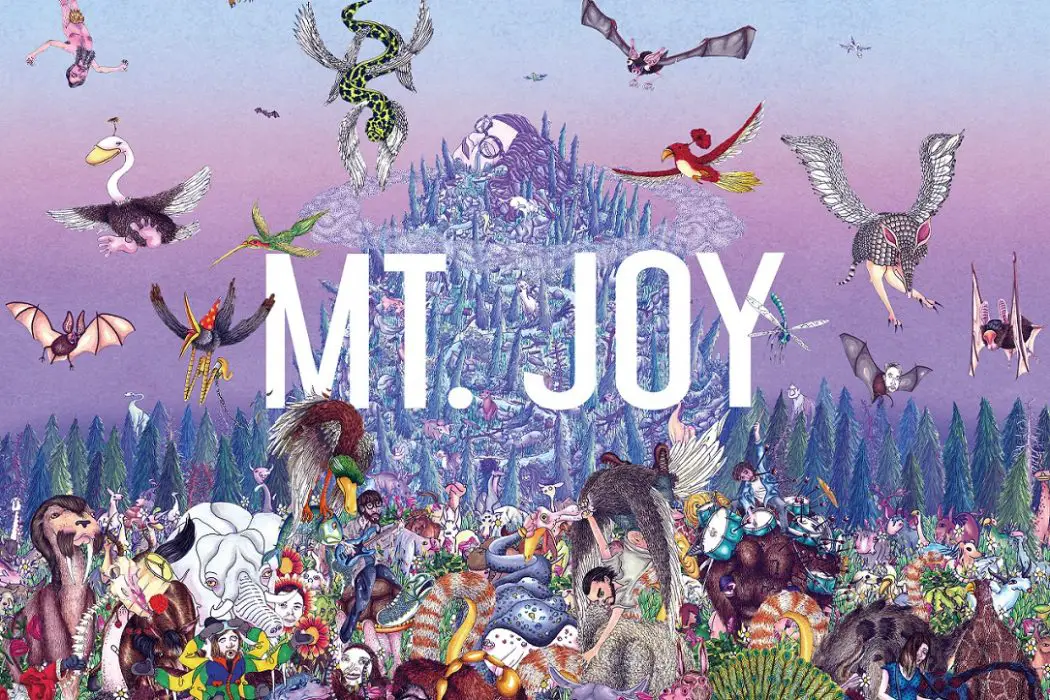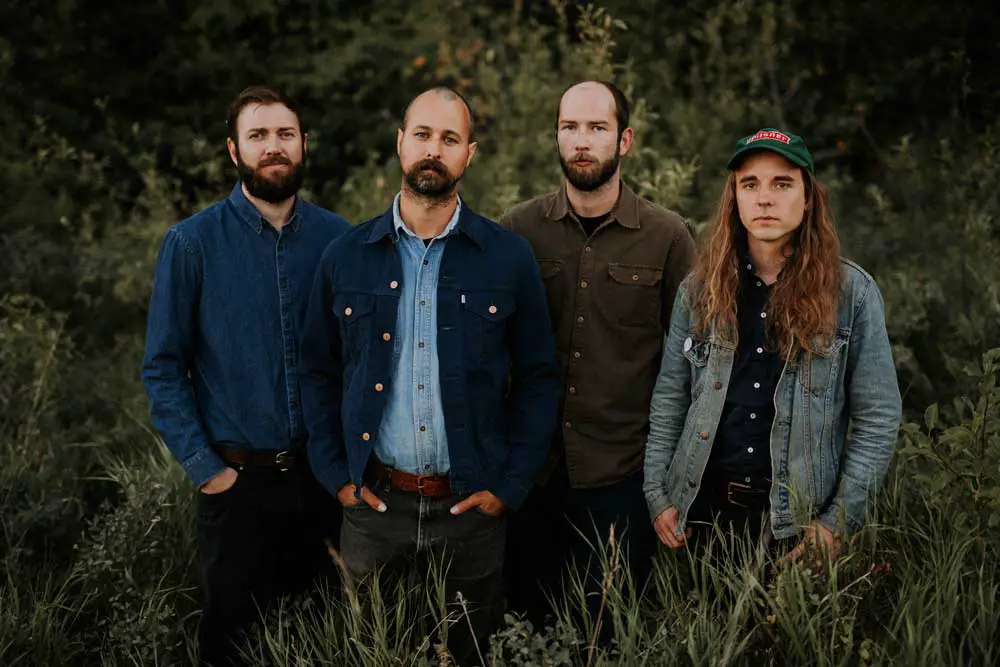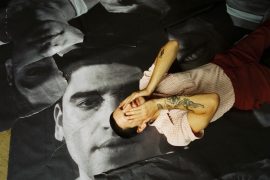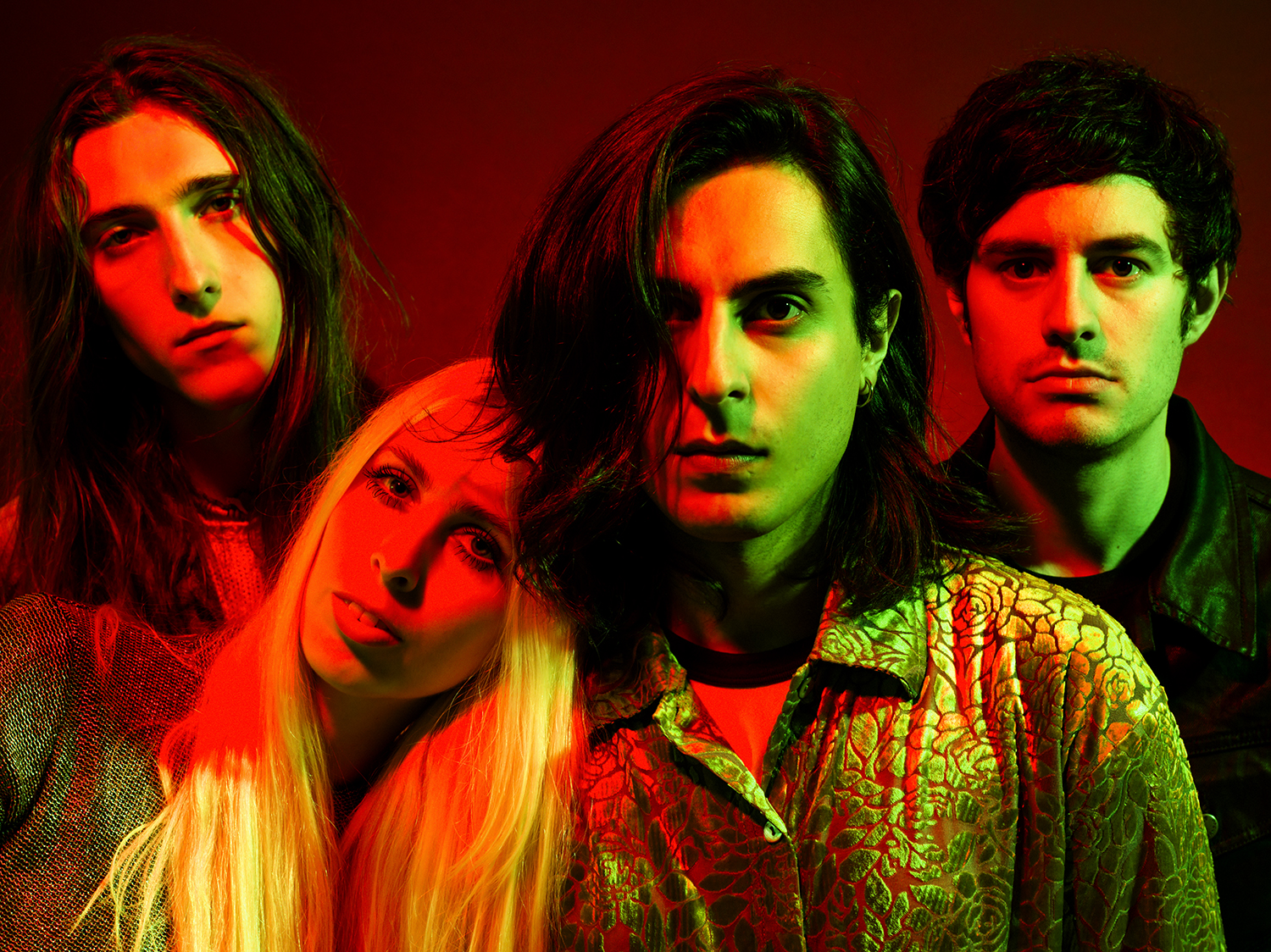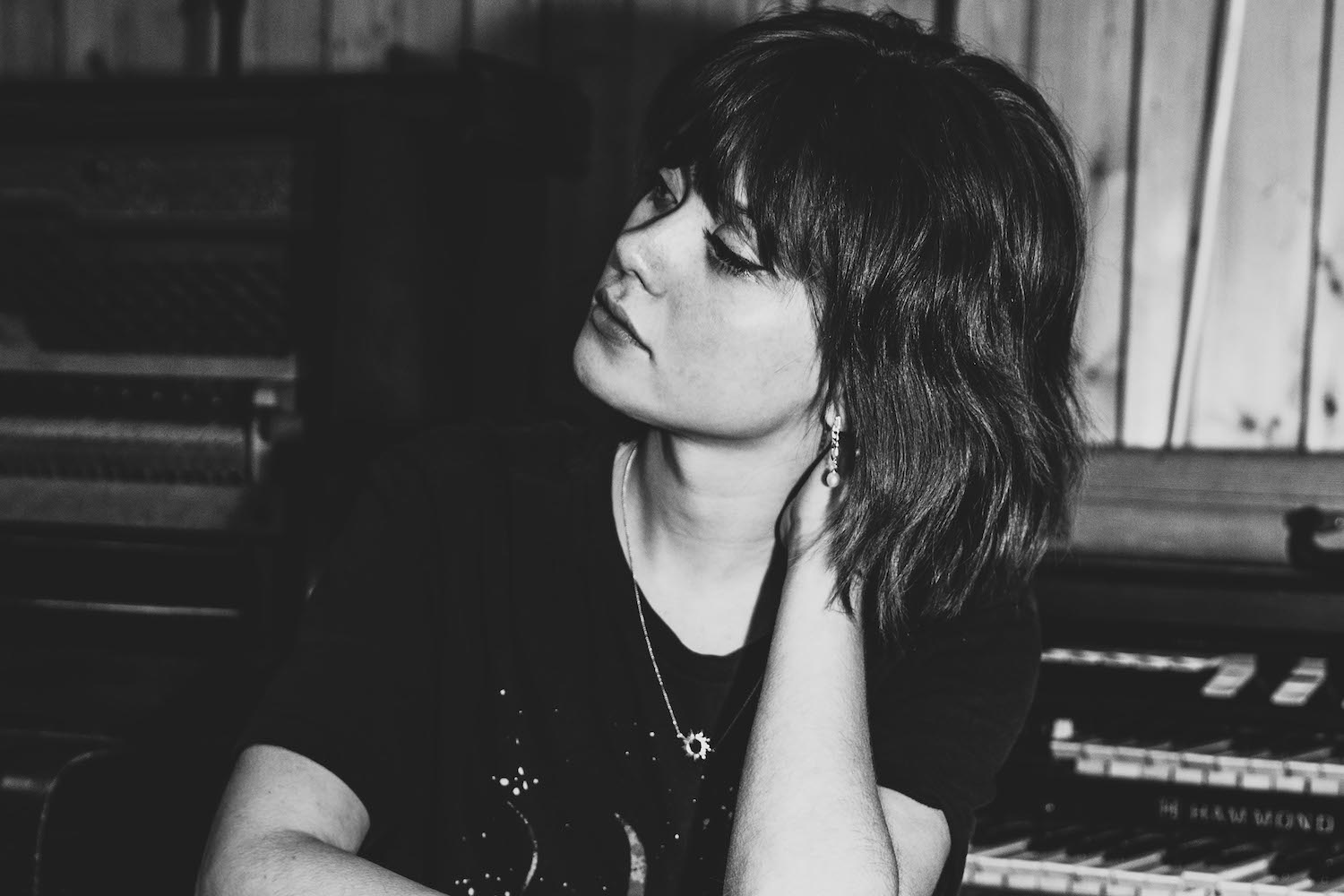Mt. Joy’s Matt Quinn dives into the depths of the band’s spirited sophomore album ‘Rearrange Us,’ an ambitious triumph embracing their signature sound while plunging headfirst into the deep end of life.
Stream: “Strangers” – Mt. Joy
Released earlier this summer, Mt. Joy’s sophomore album has been a bright spark of life and love in a dark and turbulent time.
It’s an honest and urgent record of life in motion – a blend of good times and bad, of intimate seconds of solitude and intense moments of connection. It’s a breakup album – of sorts, because overall Mt. Joy aren’t wallowing in what’s been lost; rather their music and messages focus on what we learn about ourselves and our world along the way: It’s about the journey of self-discovery that teaches us more than we could possibly have imagined. Impassioned and spirited, Rearrange Us is an ambitious triumph for Mt. Joy embracing their signature psychedelic indie rock sound while diving headfirst into the deep end of life.
It’s an unfiltered, feverish and raw upheaval – the kind we didn’t think we’d need this badly in 2020, but one that arrives like a familiar hug or a loving kiss upon the cheek.
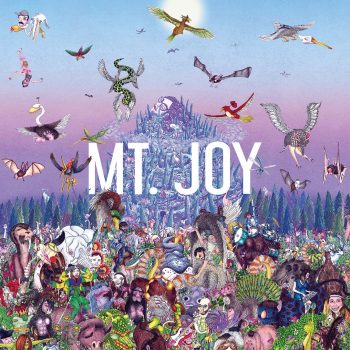
There will be peace
There will be light on you
There will be colors for you
To come home to
I’m always waiting for you girl
I’m always waiting
So maybe I’ll wait,
And maybe I’ll wait too long
You were the first
But you won’t be the last
If I keep traveling on
Always look forward
And may all your love be returned
Hold on tight
I think I might have wasted all my time on fear
But if I were
Would you be so rude and tell me what I have to hear
– “Bug Eyes,” Mt. Joy
Released June 5 via Dualtone Records, Rearrange Us is an exceptional follow-up to Mt. Joy’s self-titled 2018 debut. The forty-minute record finds Matt Quinn, Sam Cooper, Sotiris Eliopoulos, Jackie Miclau, and Michael Byrnes building upon their charismatic psych-tinged rock sound: Three years of nearly nonstop touring has turned the band into a dynamic, sleek machine – a truth that transfers onto their record through stunning emotional overhauls and dazzling instrumental arrangements, solos, highs, and lows.
“There’s this period [post-breakup] where you’re trying to figure out, ‘How do I pick up the pieces? How fast am I allowed to pick up the pieces?’ There’s this wide spectrum, I think, of that moment,” Matt Quinn says. “Different people were going through different things at different times, so the record sort of… It has songs that are about picking yourself up after something like that, or falling in love with strangers… But then it also has like, ‘On the day you left, I could tell by your text that you were gonna ruin my life.’ It zeroes in on the specific moments too.”
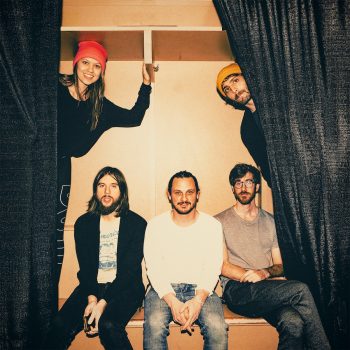
Rearrange Us is achingly small and extraordinarily grand – an organic exploration of contrasts opening with the emotionally epic “Bug Eyes” and flying high through charismatic tracks like “My Vibe” and “Death,” all the way through to the beautifully rustic groove, “Strangers.” Along the way Mt. Joy explore what it’s like to love and lose; to dwell in isolation and know the true meaning of commiseration; and to celebrate the little things, from fleeting smiles to Christmas and the simple joy of being alive.
“We tried to make something that was a really big part of what we were doing, it was like we wanted to make something… in the Abbey Road sense, where you can drop the needle and things flow together and it tells sort of a story in the order that it’s in,” Matt Quinn explains. “And that was something we wanted to do, and I feel like we accomplished it. I know most people probably won’t consume the record that way, and we were definitely aware of that, but that was something that was important to us, was to try to make something that played like a movie from start to finish.”
Rearrange Us is cinematic: A dramatic and emotive outpouring we’ll be returning to for years to come.
It’s a modern rock classic, full of excitement and introspection, spirited passion and innate electricity. Mt. Joy perfectly capture their compelling live energy on record, delivering an immersive musical experience that brings us closer to the band and closer to ourselves. Their thirteen songs are transportive, allowing us to leave our bodies without venturing beyond the confines of our homes. But this album isn’t an escape, per se; it’s an indulgence – an unapologetic look at heartbreak and the growth we all undergo in the healing process. It’s catchy and impulsive, soulful and bright – a beacon of hope for all who need to hear it.
Dive into the depths of Mt. Joy’s Rearrange Us below as Matt Quinn opens up about the record’s origin story, its songs, the band’s growth, and much, much more!
It’s kind of us trying to be a little bit off-kilter at times and psychedelic, while talking about some pretty bitter and some kind of sweet things.
— —
:: stream/purchase Rearrange Us here ::
Stream: ‘Rearrange Us’ – Mt. Joy
A CONVERSATION WITH MT. JOY
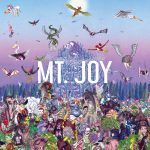
Atwood Magazine: Hey Matt, how are you doing?
Matt Quinn: Doing pretty well, how about yourself?
Doing okay. I was trying to figure out right before I got onto this call, has it been three years? Maybe two and a half? It's been a long time.
Matt Quinn: Something like that. I always… Whenever I try to look back. It’s always either way more time or way less, I don’t know. It’s a weird experience, looking back.
Yeah, I know it's kinda crazy and so much has happened in that time, but I'm really excited that we were able to reconnect on this.
Matt Quinn: Yeah, yeah, thanks for doing it Mitch, I appreciate it.
I mean, of course, you know that I think that the music that you're making is some of the best right now, so it's an honor to get on the phone.
Matt Quinn: Well, thank you, man, I appreciate that.
Before we get started, I just wanted to check in with you and your family and the band. How is everybody doing?
Matt Quinn: I think everyone’s doing okay. All things considered, with everything that’s going on in the world, I think everyone’s healthy and the families are healthy, so we all kind of got thrown all over the country, but I think that’s ultimately been a small price to pay.
Well, I’m glad to hear that. To start off, I thought we could talk about how the Mt. Joy of 2020 is different from the one we spoke about a few years ago.
Matt Quinn: I wish I could read my quote of what I thought Mt. Joy 2020 was going to be. [chuckle] I think just at each level for us, it’s grown beyond what we thought it would. So for us, I think it’s just we’re excited that now we have an album that’s about to come out, and we feel like… I think if we would have known that this was the record that we would have made, we would have been really pumped. I think we’re really proud of it. We’re stoked about the way sounds and the way it was recorded. And we’re just… I think at this point, outside of all of the Coronavirus stuff, which is a hard thing to push aside, but we’re just really excited to be releasing this album and hopeful that it will resonate with people.
Prior to statewide shutdowns and quarantine, Mt. Joy had been heavily touring a country for a few years. How has touring changed to you... You just talked a little bit about it, but how has touring changed you and how do you think it's impacted the band as a whole?
Matt Quinn: Yeah, I would say touring has changed us in a lot of ways. I mean, it’s changed for sure a lot of our personal lives and the way we, I guess, look at the job that we do. It’s really been shaped by the fact that we spend a good portion of our year traveling and playing shows and being away from home, so that’s the personal side of it. But then on the music side, I think it really shaped us in a way that’s been really positive in the sense that the first record was just like a singer/songwriter project, where everything was pretty mapped out and kept relatively simple outside of just supporting harmony and the words and lyrics or the melody and lyrics. So for this particular project because we’ve been on the road together as a band, we just kind of bring people in to record parts. We’ve been playing together now for hundreds of shows and know what each other are good at and how to support each other in different ways, whether that’s going for a jam or even something more subtle. So I think when we went to make the record and we chose Tucker Martine because we knew that he really liked to record things mostly live and then kinda do overdubs later, so for us, that’s what we became comfortable with and that certainly has everything to do with touring so much and has become, I think the lifeblood of everything we do, playing live.
I love that, I love that so much. I know part of your story is how living your childhood dream has led to some shedding of those rose-colored glasses. Can you talk about the experience, that experience and how it plays out in your music?
Matt Quinn: Yeah, I think everyone… Like for some people at least, myself included music is like being an astronaut, but I’m sure has rose-colored glasses [chuckle] as well, but it’s just a dream type job, at least it was for me. And there’s realities with any of those things and I think part of it is just being away from home for so long and the travel and it’s… Hours wise, it can be a pretty draining job and something, especially in the beginning. Financially, it’s hard to figure out how to do. I think people probably vastly overestimate how much money musicians make and stuff like that but at the end of the day, it is something I really love to do and I get do that for a living, so I think you’re just kind of balancing that and it gets better all the time, I guess, as you’re able to succeed at varying levels of it. But for me, I think there was definitely a moment where I was like… Once we had reached the point where we were touring so heavily and things were really changing in my life, I was wondering, “Is this what I wanna be doing?” And then I think part of the great process is making those record was it felt like something I had to make, not only to advance the band, but to get a lot of things off my chest. So I think in that moment it was important and I realized like, “This is what I have to be doing it and it’s the only thing I can be doing right now.” So…
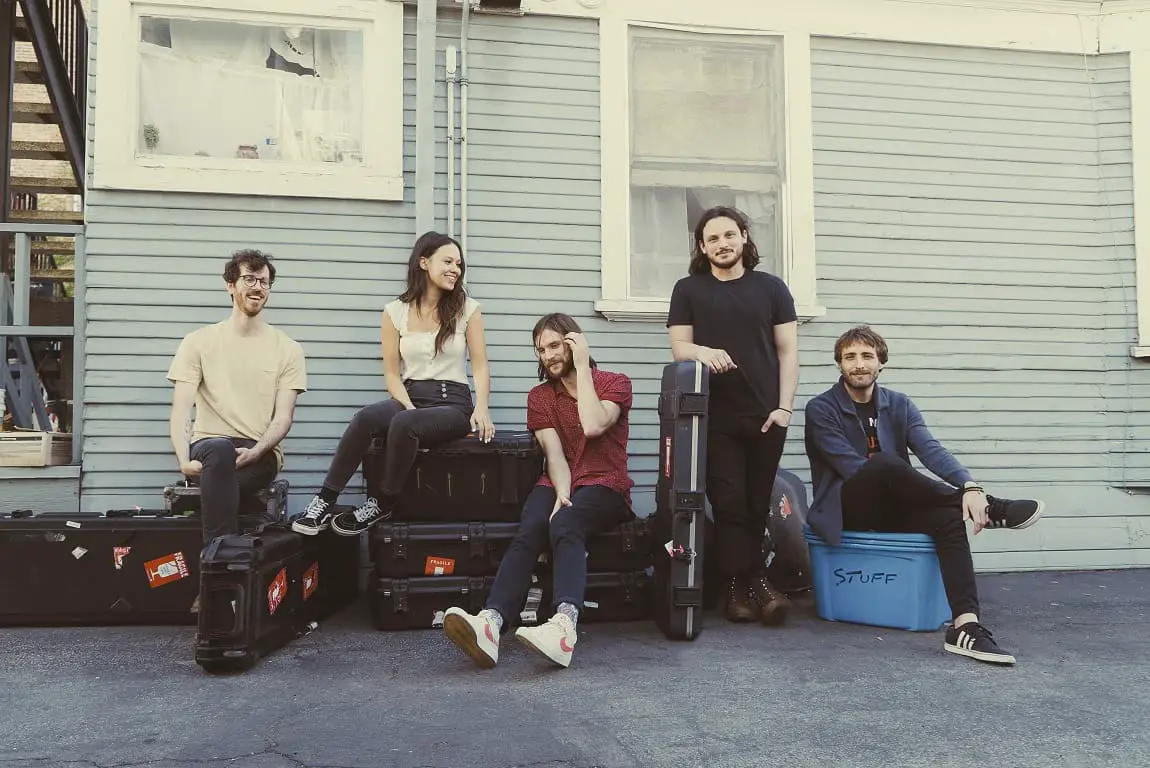
So could you have made an album like Rearrange Us two years ago?
Matt Quinn: Definitely not. We weren’t good enough as a band to make an album like Rearrange Us and we… I just don’t think we had the experience to… The experiences and I think it’s a collection, not just of my experiences, but I was also sometimes writing about things that were happening to my bandmates and the people that I’m around pretty much 24/7, so I think… Yeah, that there’s no way to… This record is very much about Mt. Joy and our experiences and then when you zoom in on individuals and their experiences, I think that’s where hopefully it really resonates with other people who have similar experiences.
What do you mean by the record being about Mt. Joy and your experience as a band?
Matt Quinn: I just mean we really toured extremely hard and heavily the first record to the point where when it came time to make the second record, we really ended up having about six weeks and kind of tied together. I had a bunch of song ideas and people had… Parts we had gone over, some of the songs we’ve been able to come about like on the fly but we really had this… We played a show in Los Angeles in April, and I think our first day of recording was June 1st or something like that. So we basically were like, “Alright, we have to get together and bring all these song ideas together as tight as we can and head out to Portland and make a record.”
And because of that, I think it became a thing where it was like, “Alright, this is the only way to really do this is to make it biographical and write about what we’re going through and… ” And certainly some of the things that people were going through were almost all seemingly happening at that moment, it seemed like such a breaking point for people in our band and literally the day we went off to… The day before or something, to go off to Portland for the better part of the summer to record the record, there were multiple break ups in the band at that exact moment, so it just felt like we were almost weirdly in sync, for better or worse, so… [chuckle] I think the record just… It wrote itself in that way.
I love that organic nature.
Matt Quinn: Yeah.
Do you... That's so interesting. So you didn't really write on the road you really just wrote in a short timespan.
Matt Quinn: Yeah. I would say we wrote… I wrote on the road a lot in terms of like there were song ideas that were things I’d been peeking at, or I felt like I was three quarters of the way done. But we never really got a chance to sit and truly workshop the songs as a band until April. There was the occasional soundcheck like, “Hey, I have this idea,” and then… And with songs for us, at least sometimes, I… Myself or someone will bring an idea and it will just click, everyone falls into their parts and those end up being the parts and the song comes together very quickly and we’re like, “We should play this song at some point in the show,” and then all of a sudden it gets put in and there were songs like that that we put into the set before we even recorded. So some of them came together quite quickly and then some of them I would say about half or more of the record was like we really need another six weeks maybe to finish 50, 60% of the record.
You just hustled?
Matt Quinn: Yeah.
I forget who... There's been two or three artists whom I've seen, where they've actually said on the stage, “Hey, this is a song I'm just workshopping. I hope you enjoy it.” It's so rare that a band does that, so props to you guys!
Matt Quinn: Yeah, I think sometimes it’s just like we… When you have a new thing, I’m sure the same is true for you. Even in writing. When you have this new thing and think you did a really great job on it, it’s the best thing to share. Because the other things I feel like are… You just do them so often that they lose the lustre of a new song that has all these possibilities for sure.
Yeah. So I feel like the term itself “Rearrange Us” is so appropriate for the current moments with all of us adjusting to a new kind of lifestyle, and a new way of living. Where did this term come from?
Matt Quinn: Yeah, I had written actually, the song called, “Rearrange Us” on the record was just an acoustic guitar thing that I had… Actually almost made… It goes back to… Parts of it at least go back to, it almost made the first record.
Wow.
Matt Quinn: And the idea of it was that at that point it was like we were in a different place and quitting jobs and doing stuff like that. But just the idea was that our lives were being rearranged in a pretty aggressive way. They still are and it’s still very relevant. And it just felt like you kind of… When that happens, I feel like time moves in a really weird way where it slows way down and you’re maybe thinking about… You have these moments where you’re really thinking about how much things have changed. And in those moments, you end up I think reflecting along on your life in a way that you don’t when things stay the same all the time. And that’s what the song is about. It’s just like, I think the more things change, and you’re forced to deal with that change and really put all these different markers in your life, I guess. For me, it’s been a weird sense of time speeds up and slows down.
All at once.
Matt Quinn: Yeah, exactly. So sometimes it feels like you’re flying and I feel like it’s true in this pandemic experience because I think it’s been also a really very traumatic experience. I feel like a lot of people probably are experiencing that where sometimes it feels like they’ve been doing this their whole life, but then when they think back, it’s only been six weeks or something and that’s not really that much time. It’s a weird… It’s weird to gauge time I guess, that’s the purpose of this song.
I affectionately call it the before time, and you're so right. It feels so weird.
Matt Quinn: It’s strange.
This is the first album you made consciously knowing you were recording an album, is that right?
Matt Quinn: Yeah. I think the first one we didn’t know what the heck we were doing at all. We didn’t know if anyone was gonna hear the songs or even after then… Was doing well. But we certainly didn’t know that. This was the first one where it was like we were set in our record label and we knew that they expected a certain thing and we wanted to make that certain thing. So that was pretty much fair.
How did that mindset change or guide your approach?
Matt Quinn: I think for us, if I’m being honest, it mostly just… It pushed us throughout. It pushed me at least throughout the touring process to know that at some point there’s this test coming, where we were touring so much that it felt impossible to sometimes be creative. And especially the days would often start early and end early as well in terms of 20-hour days, and crazy… Just no time to write. So I think for me, it was always this thing that was just the test at the end of all this was coming and looming. And if we could pass the test, then maybe we’ll get to keep doing this, but if we totally flunk it and have a terrible album, then it could be truly the end of our career, so there’s only kind of a pressure, but maybe it’s good pressure in the sense that at some point it was something that I knew that we had to accomplish in spite of or alongside of all the touring.
That sounds like a lot of pressure you put on yourself, I gotta say. Do you feel like you know the answer to the test yet?
Matt Quinn: I don’t know. If everyone just absolutely hates the song… So far, it seems like there’s been a reasonably good response. But I feel like I was able to take some time away from the record and then listen to it at some point during this whole pandemic, and I just just had… Am at peace with the idea that I think it’s the best thing we’ve ever made. And that’s a totally subjective statement to what you’re looking for, but for me it’s I feel totally at peace with what we made and I’m really proud of it. So if everyone hates it then I made it for myself and I’ll just listen to it.
You're entitled to it. From a greater standpoint, is there any concept or theme that you feel binds all the songs on Rearrange Us together?
Matt Quinn: Yeah, I think it’s a record that ends up being, in some respects, a breakup record. But it’s more specifically I think, because it was just capturing this moment that we were all experiencing, I think it’s… It more captures the uncertainty that people also write about a breakup in terms of never gonna see you again or sort of they zero in on the moment of two people parting. But it’s usually this much larger thing that has this period that happens that exists beforehand that’s a very specific emotion when things started falling apart. And then there’s this period afterwards where you’re trying to figure out, “How do I pick up the pieces? How fast am I allowed to pick up the pieces?” There’s this wide spectrum, I think, of that moment. And I think different people were going through different things at different times, so the record sort of… It has songs that are about picking yourself up after something like that, or falling in love with strangers or… But then it also has like, “On the day you left, I could tell by your text that you were gonna ruin my life.” It has these… It zeroes in on the specific moments too, so I think…
What's that lyric from?
Matt Quinn: That’s the lyric that opens the album on “Bug Eyes.”
Thought so.
Matt Quinn: So I think we tried to make it in this way that’s almost like a Jon… I love Jon Krakauer books. And I feel like the way he does it, is this non-fiction thing where he tells you right away, it’s like, “This guy died. The man you’re reading about does not survive this book but here’s a cool story about his life and how it happened and how it got there.” So I feel like we give that away in the beginning and about at end of the record, you got, “I guess I’ll have to fall in love with strangers.” Is a lyric in the last song, so. I think we tried to just cover the whole experience because that’s what we were going through. And I felt like that was a more interesting way to look at it than just write 12 really sad songs.
I get you there. So can we dive into the songs themselves?
Matt Quinn: Sure.
“Bug Eyes” is such an emotional introduction to this new collection. I mean, you just quoted it yourself. Just like “I'm Your Wreck,” which I remember us talking about, the song has two distinct sections that showcase the band's energy and power. But why do you open with this song, “Bug Eyes”?
Matt Quinn: Yeah, for two reasons. One, I think when we sort of put our heads down and made it, I don’t think we thought of it necessarily as an opener outside of the composition of, we thought it would be interesting to come back in a similar way to Wreck with a sort of song with an A and a B section. And then once the song was written and we knew what it was, it made sense to us as the opener, given the collection of songs. Because, like I said, I think it comes right out and it exclaims what we’ve been through. And we had some goofy songs on the first record, and I think that we’re gonna continue to write goofy songs and do all that stuff but, hey, we’d be remiss to not mention what we’ve been through has been a lot of fun but also has really punched us in the gut at times. And I think we wanted to be able to set the tone of this record that, “Hey, sometimes we’re gonna talk about some dark stuff on this one.” But I think we’re gonna do it in a way that’s us and that we feel like is interesting and, yeah, and I just… It ultimately also probably can be simplified by the fact that when we listened to it was truly… Our producer, Tucker, and really everyone was just… Felt really strongly about the song, from start to finish, that it was just a really strong, strong opener in terms of… If you don’t like that song then you can probably turn away [chuckle]
I hear you on that. You know me, I'm always a sucker for lyrics. “May you always look forward and may all your love be returned,” you sing at the start of “Bug Eyes” right before the big build-up. And later you end with this stirring line.
Matt Quinn: “To live and die and see the world through someone else’s eye,” yeah.
Can we talk about those lines?
Matt Quinn: Yeah, I mean, I think again, it’s just that song is very much about, obviously, a breakup and I think there’s… Those were just two lines that kinda came through when I was thinking about simplifying. One of the weird things about a breakup is you have all of this time that you spend and invest in each other, and then you reach this weird moment, which I was sort of zeroing on, where it’s like, “Okay.” And then it just ends. It’s just you’ve kinda cut the cord and people go their separate way. And so, I think it was the first line, I guess, is just wishing that person well but really hoping that it doesn’t get into this back and forth situation that I think the record, like I said, talks about that before and after and how things are strange. So I think it was just like, “Hey, if we’re… To look forward and may all your love be returned,” is sort of like if we’re gonna do this, then let’s go forward and then I hope it works out well for you.
And then the next line is, just how I was just thinking about how strange it is to spend that much time with someone you feel like you’ve sort of gained their perspective and that you see the world through that lens. And then you’re moving through the world without them but you, of course, still see things from that perspective. Whether it’s a shared perspective or something uniquely that that person always saw something a certain way. And then you are left with this experience. It’s almost like a cognitive tattoo of that person, I guess.
That's fascinating. I really love that. I really love that description of relationships. I think that's really interesting.
Matt Quinn: Yeah.
The title track, “Rearrange Us,” was also the lead single for the record. You were talking about how this song was so old. Was it kind of intended to be a bridge between old Mt. Joy and “new Mt. Joy?”
Matt Quinn: I don’t know, maybe. I think it was really just a song that existed in song form like this, “Come on rearrange us.,” sort of existed, and we always loved that idea, but we just never could find the right arrangement for it. And then, literally, that was one of the ones we just came back from lunch and sitting in, and Jackie and Sotiris were jamming, like piano and drums. And I was like, “Hey, that’s the interval to Rearrange Us that you’re playing with now.” And then it became this thing where everyone quickly sat down and started jamming out parts, and just like I said with the live show, we had that experience where we’ve done that before together, and it really came together in about, in terms of the arrangement, in about a couple of hours of just sitting there, playing through it and then we recorded it live, got a take we loved and it was off after the races. So I don’t know if there was any specific intention in terms of like, “This is an old song.” As much as it was just a tune we had the skeleton to and really loved, and then everyone brought this totally different flavor and it felt new and fresh and hopefully, maybe, it does bridge the gap a little bit.
I love that and when I hear that tune I always think about “Miss You” by the Rolling Stones.
Matt Quinn: Oh. It’s a great song.
It's got that groove to it, and it's great. “It seems like a short life, but it feels like a long time when I remember everything,” you sing in the chorus of that song. For me, this is one of the best lyrics on the album. One of the things that I've thought about a lot with this record, especially, is the lyrics – I spend a lot of time dwelling in your words and stories. Is that something that's conscious for you as well, that you've thought about really in terms of what you're trying to say and the statements that you're making? The philosophizing, if you will?
Matt Quinn: Yeah. I always try to be as thoughtful as possible, and sometimes things come quickly and even when I’m not necessarily writing with the band, I have my notes in my phone and I’m just sitting on the bus or in the van, looking out the window, sometimes things like that will come to me almost as answers to my own issues and I’m like, “Oh. That could really work in a song some day and… ” And so I’m always gathering lines like that, and it’s not something that got pressed into the six-week time frame. And, yeah. I think sometimes it’s good to be really heady in a song and try to be prophetic if you can or something, but then I think there’s the other side of it too, which is like, I do definitely know that sometimes just being goofy and free of conscious is the way to go for lyrics too. So I think it can go both ways.
And to back that up, I really love some of the jams that you build up on “My Vibe” and “Come with Me.” Are these the kind of songs you were able to make thanks to your experience with the live setting?
Matt Quinn: Absolutely, yeah. I think for us, we figured out pretty quickly during touring that, and in opening for various bands, that there’s two types of folk bands out there, and both are great. This is not like a shot across the bow at any of the bands, it’s just… There is what we call the talent show kind of thing, where bands get up, they have these songs that are beautiful and beautifully arranged, and they just drill the arrangements and it’s stunning, and it’s perfection. Right?
Yeah.
Matt Quinn: And it’s just like, “Wow! These people are amazing. And it’s a great show.” And then there’s this other zone that we really wanted to be able to live in where it’s like the record serves as the guide that there is… There are medleys, there are connections, there are jams and the songs hopefully have that same level of drilling what’s playing on the record, but there’s this extra added musical influence and letting people express themselves in an improvisational way and stuff like that.
And we had a chance, basically, to work on that, and we’re still working on that trying to become a band that can improvise, and also perform the record faithfully as well. So I think taking that and doing that for a couple of years, oftentimes when we’d get to a certain place in a song where we were at a dead end, “Well, now what do we do?” It’s kind of like, “Well, let’s play.” Let’s play and let’s try to figure out something that says something without words. And I think there are a couple of moments on the record that we’re really proud of in terms of just some really cool musical expression and really just elite playing, which I think is somewhat rare in our profession. Not in terms of there not being good players in the folk world, but just like I think often they hold back and they go for more of a minimalist approach.
I was so happy to see “Every Holiday” make the cuts. We talked about that song earlier last year. It joins songs like “Have Faith” and “Witness,” and some of the album’s softer moments, of which they are actually quite a few. I'm impressed by the range of dynamics you display across this record. There is much more contrast than most folk or rock bands dare show, and I would say that you're a little bit of both.
Matt Quinn: Yeah.
What is your approach to dynamics and volume? What do you think about when you're laying out these songs?
Matt Quinn: I think for me, I think dynamics in general are one of my favorite songwriting tools, in terms of whether it’s song to song or even within a song. I think I’ve seen shows where you get so blasted by this high-octane energy. And it’s amazing, but I think some of my favorite shows have been bands that… I was a big fan of Broken Social Scene. There’s a band, I think, that does this really well in a kind of quirky way. They’ll have like 13 people on the stage, and it’s like this just electric super giant guitar situation that’s bouncing off the walls, and then they play like a much… Song like “Lover’s Spit” or like, which is like a slower song and really takes it way down. And they do that throughout an evening and it creates for me a pretty interesting experience, and I think that’s something I’ve always wanted to be able to do from a record standpoint and from a live show standpoint, is to be able to take people on a sort of like an arching journey. And yeah, I think that’s something that just a lot of our influencers that have done that at a really really high level, and we’re just trying to follow.
I was startled to see a song named “Death,” but it's actually incredibly colorful and full of life.
Matt Quinn: Yeah, I think there’s something there.
“There are holes in your eyes, full of impossible light,” you sing. It's beautiful. Can you tell me more about that song?
Matt Quinn: Yeah, I think this is a song that’s just sort of in general, tried to be a song that we didn’t over think and was just a simple song about when you get down on yourself and you’re going through the motions in life. Things can reach a fork in the road, at least for me, where it’s like you can choose to reach up and have people help you and let them know like, “Hey, I’m like… ” It’s left or right here, either I reach up and ask people for help, or I go down this really dark path where I start getting further away from life. I start going into that darkness that hopefully there’s a bottom to, but for some people there isn’t. So I think it was just simply that like the, “Hey, you should always remember that you can make a choice to reach out for help and people will be there in your life to help you, and there’s so many reasons to stay and stick around and not go down into that dark well.” And that’s pretty much… It’s pretty much the song.
And in terms of naming it, we had a hard time because like you said, I think the refrain start was like, “I know why you like death,” which is sort of… The idea of it is like, “I know why you love the idea of like this ultimate peace,” because you’re not feeling well, and that makes sense that you would let your mind wander down that path but, there’s a pretty big but in the song, I think. So we were struggling with whether or not to call it that, and it’s pretty terrible now or hilarious, however you wanna look at the it. But we did a funny thing, which I’ll tell the story. It’s like basically, our management and our labels, I don’t know who exactly, but basically came back and was like, “We love the song, we think it might have a chance to be a single or something like that.” This was early on as we were turning in songs, they were like, “So, maybe we don’t call it Death, ’cause it might be kinda hard to play on the radio or whatever opportunities it might have, if the song is just called Death, people might steer clear of it.” And we were like, “Ah, come on, fuck that.” Or whatever and then they were like, “Let us know if you can think of another title.” We tried, we tried, we tried. We couldn’t really think of anything else that stuck or that felt better than that.
And then our producer always… So the opening lyric is, “We’re all just debt collectors in an absence of grace, blah, blah, blah, blah, blah,” but he thought, jokingly, one of the first time she heard it that it was like, “Roger the debt collector.” As in some guy named Roger who’s a debt collector. So we thought it would be really funny to call the song Roger The Debt Collector and it would put a spin on the song, where the song is just a guy, which it is sort of about anyway, it’s sort of like a removed third person thing. So we turned that in thinking, “This is really funny and people will go to this track.” ‘Cause they’d be like, “That’s a funny name.” We thought it would draw people in and they were like, “Really? You went from Death to Roger The Debt Collector? We can’t use the title either.” We were like, “Ah damn.” We were like, “Well, you know what, we think it’s funny, and that’s the one we’re sticking with. So you either get “Roger The Debt Collector” or “Death,” and they came back, like a day later and said, “I think ‘Death’ will work.” [laughs]
That's awesome. Another thing that strikes me is that Rearrange Us has a lot of space. I'm thinking of songs like “Acrobats” and “Let Loose,” where the band really lets light pour in and takes time for those feelings to build. Those moments remind me of groups like The Grateful Dead and Led Zeppelin – bands that just thrived on stage, and when you got a hold of a live album, you knew it was going to be totally unlike something that you had heard before.
Matt Quinn: Yeah. That is definitely true and that’s one of the… First of all, I shouldn’t say it’s definitely true that we’re like Led Zeppelin and The Grateful Dead but certainly we would love to strive to be a band that’s semantically similar to that, in the sense that I just find it personally more interesting to be able to… In a live setting, you bought a ticket to see something other than the record and the record is certainly gonna be displayed and you’re gonna hear the record and sing the song and we’re gonna do that together but we can also… If we’re a little angry that night we can play Acrobats a little extra and make you feel it and people will feel that or something like that, that’s outside of this record that we made but in a different environment at a different time. So…
But Matt, as somebody who's written music, recorded music before, I do understand how hard it is to capture that live energy on a recording. Have you as a band ever struggled to do that, or is that one of those things that comes naturally to you?
Matt Quinn: I think there were times even on this record where for example like, Bug Eyes, or songs maybe like Acrobats where the point is, at some certain points in the song it should be big, and it should hit hard and it should feel angry or it should feel like… When you’re trying to put an emotion through a microphone and capture it, it’s a little harder than doing it live when they can see your face and see that your controlling your body or whatever. So without that, I think there were a couple of moments where, like I said, all of this record was recorded live to an extent, of course. Obviously there are overdubs but the tones of it were the five of us.
He had a studio that allowed like we need to be in a separate room, but we did… It’s a glass and we could all see each other, and those guys were all plugged in, direct in, they have amps in other rooms, which was just such a luxury for us because it allowed us to look at each other and play live. And there were definitely moments where I was like, “Hey. Sotiris.” Or whomever, “We need to get really mad here. We need to really take this to another level.” ‘Cause we wouldn’t be able to go in and listen to tape and go, “No. It’s just too soft.” Or, “Oh. Whatever.” So I would say, I feel like everyone from… Like I said, just a broken record, from touring together so much. If I say, “Hey. This song is about this and I can walk them through it, people pretty quickly are like, “Okay. I know what kind of emotion to put behind this.”
I hear you. I really love the intimate song, “Us.” Your vocals are incredibly beautiful here, “So if a smile is worth a kingdom come and love is but a siren song, you hit me like a brick and then it's gone, so sing to me so sweetly, don't apologize for what you had to do.” It's a breakup song, but I feel like it doesn't have to apply to love alone, it can apply to anything when the glass shatters.
Matt Quinn: Sure. Yeah. I think that was this cool song where I literally sat down thinking about my life and it wrote itself in about… Like people have these stories, I was like my first one without rest. I sat down in college and all of the words and everything to that song came out in about 10 minutes. And I put my phone on and I just freestyled it, and that ended up being the thing that was on the record, I was just something that was like in my head. I don’t know why, and I know why but… But yeah, and then it ended up being a thing that was in the same key as the song, Become. Which ultimately, originally was just a three-part song, which was Us, Become, and then Strangers. And we had a jam, went to Europe and we had this idea that the closing festivals were like… Mostly people outside of our typical fan base and we were really trying stuff out, and we have this three-part jam that would start with that slow thing and then it would go to something else and then would open up into Strangers. So when we went to make a record, part of it was just figuring out like, “Okay. But with Spotify, how does that even work? How you do just listen to one of the songs?” So we had to separate them as tracks, but on the vinyl, hopefully they’ll just flow together as one Abbey Road type three-part song.
That's really, really cool. I really like that. So “Strangers” ended up being one of the singles. And it found its own place on the record. I think it's a really nice ending. It's strong, it's a conclusive song that it harkens back to other themes like, “Lord knows we'll change, love will rearrange us, like if you want freedom, you better free someone, better not run when I'm hanging on.” Why end the album on this, what I would call a high note?
Matt Quinn: Yeah, because I think for us… I think about our sort of ethos as a band. And what we’ve experienced traveling and meeting so many of our fans, and we really made a point to do that when it was like… Really just safe to do so. So it got to a point where it was just like… It was not that we’re like the Beatles or anything, it’s just more creative like too many people at the exit to the building, and security was always getting mad at us. But we really love going and just meeting these people, and I think what we sort of saw from that was, that we do serve this thing where our songs uplift, and they definitely are dark, but they have this like redeeming wisdom, I guess. If there is any, that’s just sort of like, “Hey, it’s gonna be okay.”
I think my experience with this Mt. Joy tornado in all of our personal lives and everything else has been like, you do sort of come out of all of those situations, maybe in the moment feeling like, “What the hell am I doing?” but at the end of it all, I feel super positive. I don’t feel like my life is over, and this was a terrible choice, and so I feel like in some of those songs we’re like… You end a song and maybe feel sad, that’s definitely not where we were at. I think we have those moments and we wanted to be able to talk about them, but we felt like we wanted to close it with this thing that… I think especially when I was writing the song I was thinking like, “Okay. There’s gonna be a little tongue in cheek here.” I don’t know if that’s the right idiom. But in the sense that if you… Maybe that will protest too much in the chorus. But in the end truly just looks forward, like regardless of sort of what’s not left behind. I think we wanted to have a breakup record that doesn’t just emotionally end crushing you. I think for us, it feels like most of the time rearranging, not to quote ourselves, but rearranging those situations is exactly what needed to happen. And it probably happens for a reason, and you got to look forward and go meet some new people, or go for to new experiences or whatever it is that’s changing in your life, you have to go forward.
I get it. I totally get it. You go on, obviously, just saying, “I am over you.” It's just such a relief, and that's kind of how I felt around this breakup that characterizes this record: It's gonna be okay in the end.
Matt Quinn: Yeah. And I think I was trying to write the song for… I realized maybe afterwards that it comes off like… If you think of it from one direction, it was harsh… Like this person is over this person. But in my head, it was sort of this liberating thing, for both people. That it’s like this thing where it was trying to be a sweet song, I guess and it… Some people have definitely taken it, which is sort of, I think moral sign of our very toxic society, but people have definitely looked at it from the lens of like, “This person just screws you over and now you hate them and you’re over them,” but for me it was more like, I was more looking at the lines like, I didn’t want this to be erased but just, we got rearranged in life and now it’s like, “Okay, cool we can be… ” because the power, I guess, for me it was feeling the emotion of being past something like that is a really positive emotion so… I only went in it… Or at least for the public, sort of saw how it could be procured as super negative and mean, and I was like, “Oh well, I guess that’s just the world we live in, cool.”
Right. I think if you're really listening to the whole record, you understand what it means though, better.
Matt Quinn: Sure, definitely.
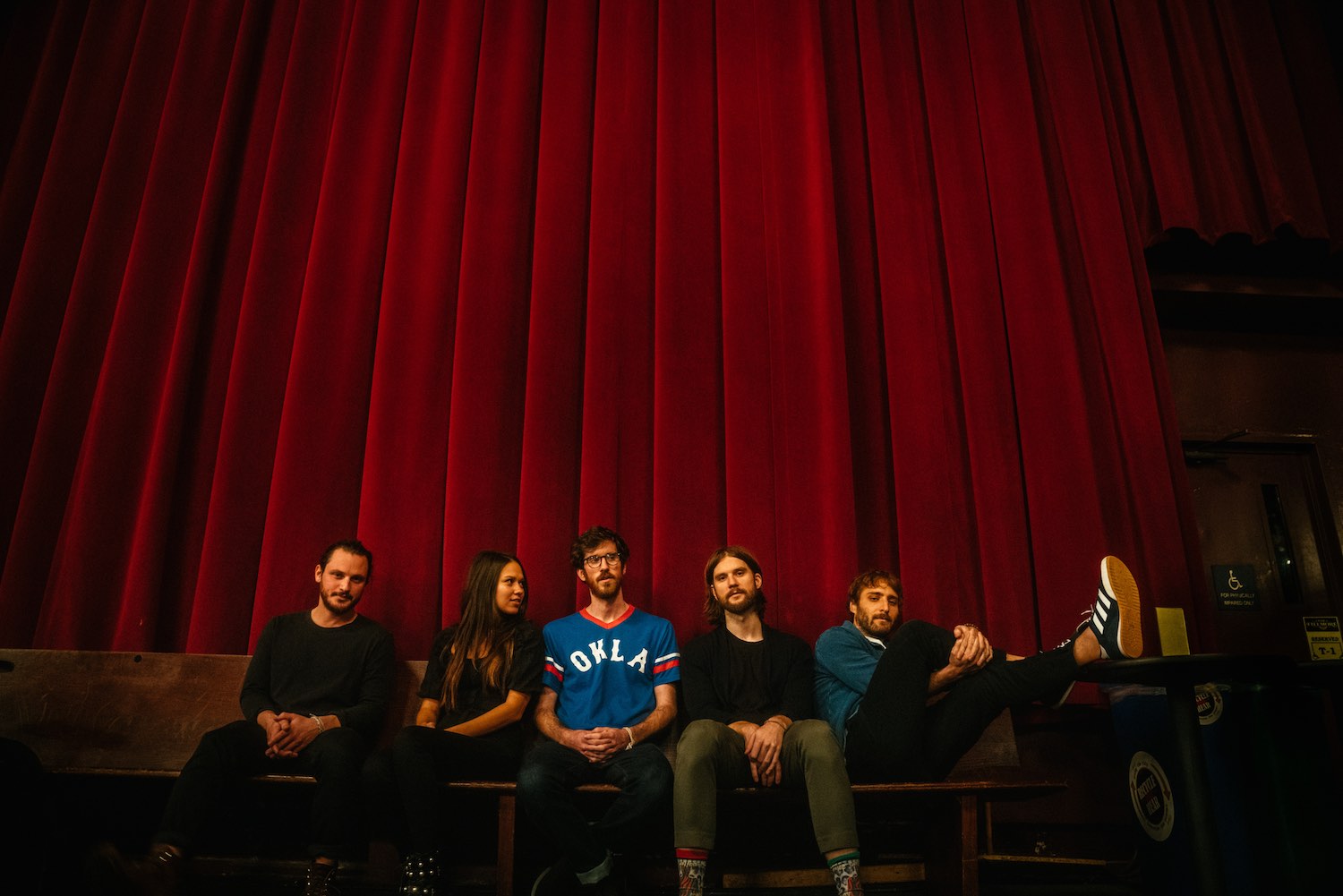
So, stepping out of it, thank you for going through with such depth for me. In more broad strokes, what are you most proud of about this album?
Matt Quinn: Broader stroke, just proud of the band, and proud of like… It’s not easy, I think… And again, ultimately, we don’t get to decide its success in terms of how many people like it, or whatever that measurement is, but I’m just proud of the band in terms of. It wasn’t easy to make this. People sacrificed so much over the last… Like you said, last however many years it’s been. We’ve all really leaned into this and there was a chance, there’s a world in which a different group of people just don’t have the juice left after all that touring, to spend almost the whole summer, going back and forth to Portland, Oregon on flights and sleeping in hotels. And so for me, the broader stroke it’s just like, we went there and we really put our heads down for a long period of time, after having our heads down for a long period of time before that. And I think we made something really special and, I think it’s honest, I think it’s real human emotion that you don’t always get in song these days when people are, maybe just more looking for a reaction than they are trying to look inward. And I think if that ends up being something where I connect with a lot of people, combined with how proud of it we are. I think… Yeah, just broadly I feel… Not to be cliche, but just super proud of the band, and I feel like… I feel a little confident that some people at least will connect with us and that will be something that we can… That explains our career.
That is all you can ask for.
Matt Quinn: Yeah.
If you were to pick just three words to describe this album, how would you even describe it?
Matt Quinn: I would say it’s a little bit psychedelic, a little bit dark, and a little bit light. I think there’s sort of this Yin and Yang in this record, and then there’s… Maybe that’s it, maybe it’s just sort of this Yin and Yang of the emotions that’s surround the push and pull of life, and when things change. I guess change is a big one, it’s really a record about change and yeah, I guess that’s probably like six words but… [chuckle] Yeah, I feel like it’s kind of us trying to be a little bit off-kilter at times and psychedelic while talking about some pretty bitter and some kind of sweet things.
That's really nice, thank you for answering that. And I'm sorry again.
Matt Quinn: [chuckle] It’s okay.
Obviously, this is not the situation we anticipated life being like when you were gonna release this record, but such is life it throws curve balls at you. How are you all doing, in terms of keeping your heads high and really hyping up this moment for all of you, what are you looking forward to with this album being out in the world?
Matt Quinn: In terms of the pandemic, and its impact on the record, I think we’re all pretty bummed in terms of we sort of saw it going one way, where we would release the record and we had this plan and all these festivals lined up, and we were gonna head out and go across the country and play new songs and, tour in the fall and all that stuff and to have that seemingly pulled out from under us is pretty crushing I would say, for a moment, and then you sort of realize like, “Okay.” But that the playing field is fairly even in terms of no one else can play any shows, it’s not like it’s… It’s an all out situation in which you can’t really feel too sorry for yourself because it’s happening to everyone equally and some people much harder right? So…
Yeah.
Matt Quinn: I think once you sort of metabolize it all or whatever the word is… Digest it all, I guess as I should say, it sort of… It sort of is what it is, and for us we feel fortunate, I guess, in the sense that we have music that’s ready, that we don’t have to figure out how to record, or like and…
There was thought about the… Pump this record and put it out at some time when you can actually tour it. And then for us, it was like… We’ve never been… You’ve been an amazing supporter and we’ve had some people who have written about us, and really supported the band. But for the most part, I think we’ve been a band that’s had success based on going out and playing tons of shows, connecting with people, and creating sort of a grassroots movement around our band that I think… I think the sort of… We’re not a big enough band to be worrying about our cultural impact yet, but I think some bands have a enhanced cultural impact because of the way that they’re covered. Maybe they’re on the front page of the New York Times every time they release a song or whatever it is. Something that’s this really cultural, large magnitude that covers every move they make. We’re just not that. Right? So for us, it was like, “Who are we kidding here? Who are we saving it from?” Our fans. These are the people that want these songs. Nothing’s gonna change for us by holding it until September except that we’re gonna piss the people off who have invested so much of their money, and time, and love into us.
It's kinda like, give the people what they want.
Matt Quinn: Exactly, yeah. It’s like, “Who are we kidding?”
I love that.
Matt Quinn: So, I think that’s sort of where we’re at. It’s just like, alright, we’re going to put this in the world. We have absolutely no idea if it’s terrible. It could be a horrible, horrible idea, and no one’s gonna listen to it and this is the last time anyone ever hears from me and this conversation’s recorded and sent to a local police station. [laughs] But… Or, it could go really great, so that’s sort of 2020 in a nutshell.
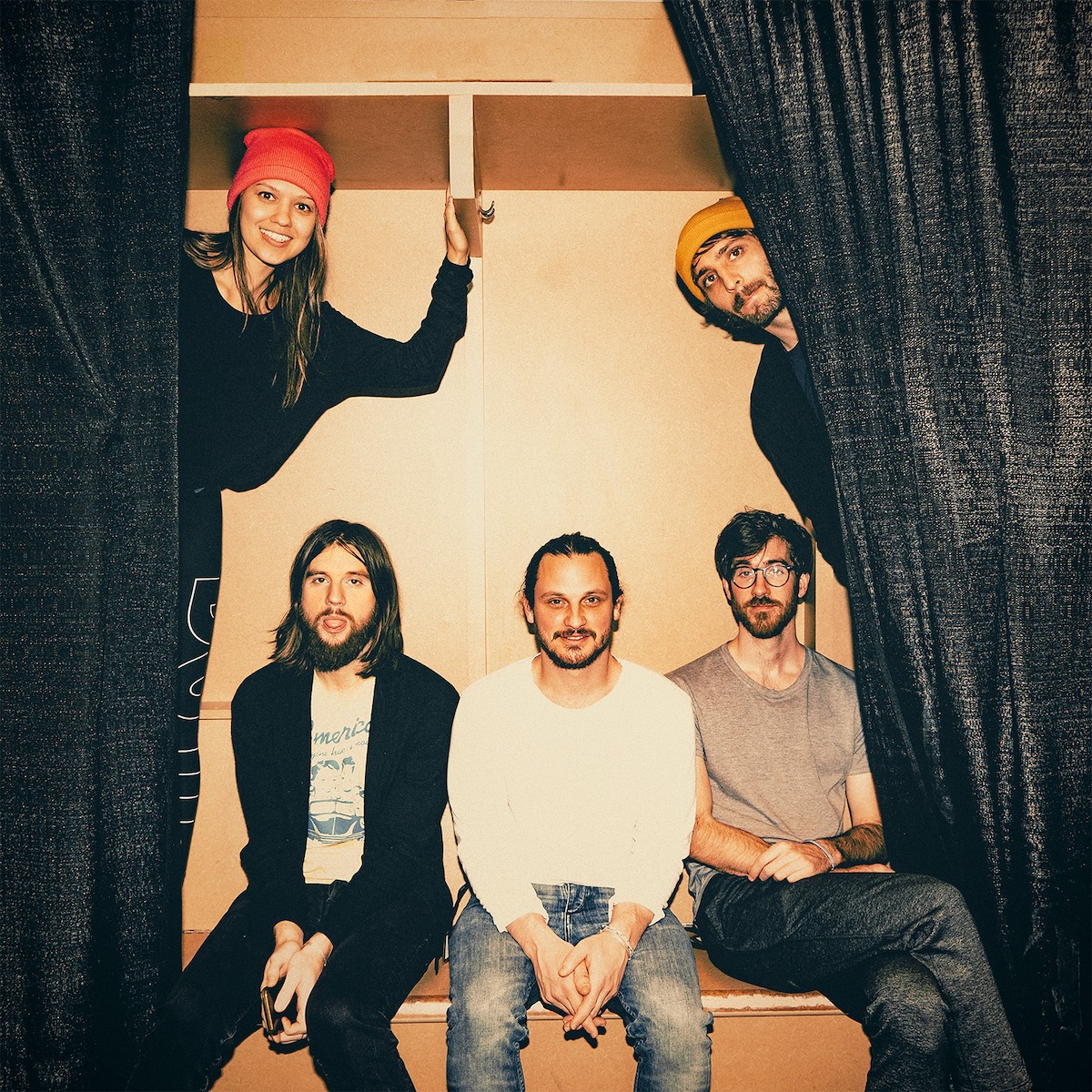
Yeah. My money is on the latter. Let me tell you, one of my buddies... I brought one of my best friends to your Rough Trade show. This is way back, in New York City, and we saw the show, we stood in the back, just took in what was happening, the crowd and everything. Went home, he immediately bought the LP on vinyl. I think people should be so excited for this album, because it really is a full experience – and I think a lot of people are looking for those kind of things right now. I think music is one of those special vehicles that allows us to go somewhere else without leaving the confines of our home, and I definitely think this album is transportive in that way.
Matt Quinn: Well, thank you, man. Yeah. We tried to make something that was a really big part of what we were doing, it was like we wanted to make something… I never wanted to say Abbey Road because it’s like I don’t wanna possibly make that the comparison point. [chuckle] But no, just something that… In the Abbey Road sense, where it’s like, you can drop the needle and things flow together and it tells sort of a story in the order that it’s in. And that was something we wanted to do, and I feel like we accomplished it. I know most people probably won’t consume the record that way, and we were definitely aware of that, but that was something that was important to us, was to try to make something that played like a movie from start to finish. So…
I like that a lot. I think that's a good template to create from. Do you think that album three is right around the corner? Are you spending your days with music or is this actually a break and a vacation from making music for you?
Matt Quinn: I would describe this as anything but a vacation. Living in New York City was stressful for a couple minutes there so I haven’t really had a chance to really sink into any sort of a vacation vibe but I have been writing, and I think some of the writing has been pretty fruitful but part of it, again, almost similar to this record and a totally different set of circumstances is that there’s no real way to get the band together and pull the songs and ideas that I have into fuller arrangements at this time. So it’s a lot of just me and my acoustic guitars. The only guitar I grabbed off of our… We keep our stuff in storage in Nashville and just fortunately… I didn’t know it was gonna be this bad obviously. Went and I just grabbed my acoustic guitars. I wish I grabbed more. But yes, I’ve been writing. In terms of, will an album three be right around the corner? I don’t know. It’s hard to predict anything ’cause who knows when we’ll actually able to get together and do things. But I would say as is probably gonna be true of every single band, it’s like… If the fall tour gets wiped out and then some people are predicting there’s not going to be touring until the fall of 2021, which is an incredibly long time from now, at that point I don’t know what else there is to do other than go record songs, so we’ll see, I guess.
Yeah. I hear you. So, just to finish up, if people could take one message away from this album, what do you hope they'd come away with?
Matt Quinn: Yeah. I guess just the most positive bent of it is that you’re gonna go through things that you think are gonna ruin your life or there are gonna be these moments where it’s like the darkest day, or whatever, but I think at the end of the day you’re just gonna learn from those things, and if you lean into the people around you, and if you kinda create a community around you, then you’re gonna come out the other side of it, and you’re gonna have learned a lot from it in a positive way.
I love that. Have you been listening to any artist specifically, recently that you're really vibing with? Who would you recommend to our readers?
Matt Quinn: That’s a good question. I’ve been doing…
That's the one that stumped you.
Matt Quinn: Yeah. No. I’ve been listening to lots of… I’ve sort of gone back… One artist I think could be interesting that definitely no one’s listening to, is called Tim Maia. He’s Brazilian but sometimes… I think he’s ’70s, ’80s Brazilian… Kinda Psych Rock… Almost some… But you know, there’s like kind of street, kind of funk type songs and I’ve been trying to keep listening to a lot of Funkadelic and just trying to keep the vibe up because it’s crazy times, so Tim Maia, M-A-I-A. A good starting point is O Caminho Do Bem, it’s a great tune. But yeah, I think it’ll be… He has this World Psychedelic Classics 4, which is a hilarious title, but it’s on Spotify and I’ve been wearing that out. There’s some pretty incredible songs in there.
That's awesome. Thank you so much. I appreciate that recommendation. I'll put it on after this.
Matt Quinn: Yes. You should.
Matt, this was so much fun. Thank you so much for taking an hour. I really, really appreciate it.
Matt Quinn: Well, thanks Mitch, I appreciate you writing about the band and yeah, thank you so much for your support.
Yeah. Congratulations to you and to the whole band. Please extend my best wishes to the entire family, I wish everybody the best in this circumstance. And congrats on a phenomenal new album!
Matt Quinn: Well, thank you, Mitch, we appreciate it. Same to you as well!
— —
:: stream/purchase Rearrange Us here ::
— — — —

Connect to Mt. Joy on
Facebook, Twitter, Instagram
Discover new music on Atwood Magazine
? © Andrew Keyser
:: Mt. Joy ::

